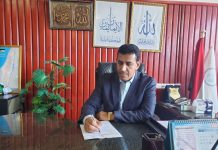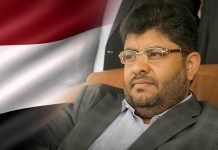The leader of the Yemeni revolution , Sayyid Abdul-Malik Badr al-Din al-Houthi, warned of the danger of aggressive American and Israeli policies aimed at targeting Al-Aqsa Mosque and all Islamic holy sites, considering what is happening in Al-Quds (Jerusalem) to pose a “grave danger” to the entire Ummah.
In a televised speech broadcast Thursday evening, Sayyid Abdul-Malik considered what is happening in occupied Quds and the West Bank to be not merely temporary violations, but rather part of a comprehensive Zionist plan that threatens Al-Aqsa Mosque and will later extend to Mecca and Medina.
He called on the Ummah to break its state of “submission and stagnation” and take serious action to confront the looming dangers.
Sayyid Al-Houthi also reviewed developments in Gaza, the West Bank, Lebanon, and Syria, praising the steadfastness of the resistance while affirming the continuation of Yemeni operations against the occupation in the Red Sea, emphasizing that the battle with the Israeli entity is “a battle of destiny that accepts neither retreat nor compromise.”
In a resolute speech, Sayyid Abdul-Malik asserted that the Israeli occupation is taking systematic steps to demolish Al-Aqsa Mosque and impose its control, amidst Arab and Islamic silence that he described as “shameful and dangerous.”
He pointed out that the Israeli enemy is pursuing a policy of gradual taming through continuous incursions and escalating calls to demolish the mosque and rebuild “the alleged temple,” emphasizing that this plan is clear and fundamental to the Zionist project.
Sayyid Abdul-Malik explained that what is happening at Al-Aqsa Mosque is a prelude to broader plans that may extend to the Grand Mosque and the Kaaba, stressing that “the Israeli occupation will continue its ambitions against other Islamic holy sites if it succeeds in its plans in Al-Quds.”
He strongly criticized the official Arab and Islamic indifference to the situation facing Al-Aqsa Mosque, describing the Arab and Islamic reactions as “a dangerous indicator of the decline and weakness of the official position.”
In a related context, Sayyid Al-Houthi pointed out that the situation in the West Bank is witnessing a dangerous escalation, with increasing destruction and attacks, especially in the Jenin, Tulkarm, and Nur Shams camps, where more than 40,000 Palestinians have been forcibly displaced, while the occupation seeks to prevent them from returning to their homes and camps.
Sayyid Abdul-Malik also warned against the expansion of Israeli settlements, stressing that the occupation continues to establish new settlement outposts aimed at imposing complete control over the West Bank.
Speaking about the battle in Gaza, Sayyid al-Houthi praised the steadfastness of the Palestinian resistance factions despite the passage of more than 21 months since the Israeli aggression, noting that the mujahideen in the Gaza Strip remain steadfast in the face of one of the most powerful war machines in the world.
He stated that the occupation “failed to break the back of the Palestinian resistance or recover its prisoners without entering into exchange deals,” emphasizing that what the enemy is doing against the people of the Gaza Strip “is not a victory but a military and moral scandal.”
On other fronts, Sayyid al-Houthi pointed to the continued Israeli attacks on Lebanon and Syria, warning of the seriousness of these violations, especially since the aggression against Syria “comes without justification other than the occupation’s ambitions.”
In his speech, Sayyid Al-Houthi praised Cuba’s steadfast stance in confronting American hegemony, despite Cuba’s geographical proximity to the United States. He called on Arab and Islamic regimes to emulate this model and take practical steps to boycott the occupation politically and economically.
He also welcomed the Irish government’s move to ban the import of products from Israeli settlements, considering it a positive step that should be followed by broader steps from Arab and Islamic countries.
Sayyid Al-Houthi addressed the recent confrontation between Iran and the Israeli occupation, emphasizing that the Iranian position demonstrated the effectiveness of force when used within the framework of legitimate rights. “Despite the blockade and psychological warfare, Iran succeeded in deterring the occupation and imposing new equations.”
He explained that steadfastness and a decisive response were two elements of strength in the Iranian position, noting that Tehran forced the Israeli enemy to halt its aggression within 12 days under the impact of military strikes while being prepared to respond more forcefully should attacks be repeated.
Regarding the Yemeni issue, Sayyid Al-Houthi affirmed that Yemen’s position against the United States, the Israeli occupation, and their allies remains steadfast, despite repeated raids and attacks.
He pointed out that Yemen carried out several qualitative operations over the past week targeting Israeli enemy sites using missiles and drones, in addition to the continued naval blockade of Israeli shipping in the Red Sea, the Gulf of Aden, and the Arabian Sea.
Sayyid Al-Houthi confirmed that “Yemen, despite having been subjected to more than 1,700 airstrikes in previous rounds of US and Israeli escalation, remains steadfast in its position,” considering the sacrifices made by Sana’a “a source of pride and honor, acceptable to Allah.”
Concluding his speech, Syyid Abdul-Malik affirmed that Arab and Islamic peoples possess the ability to protect their rights and sanctities if they unite and abandon policies of subjugation.
He stressed that “resistance is the only way to deter American and Zionist hegemony and prevent subjugation and expansionist schemes in the region.”
Sayyid Al-Houthi called on the Yemeni people to participate in a million-man rally tomorrow, in jihad for the sake of God, in support of the oppressed Palestinian people, and to affirm our continued and steadfast stance.




















